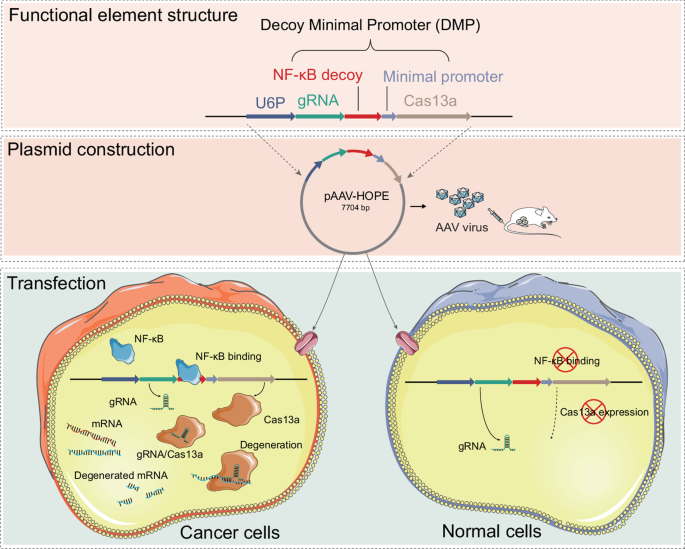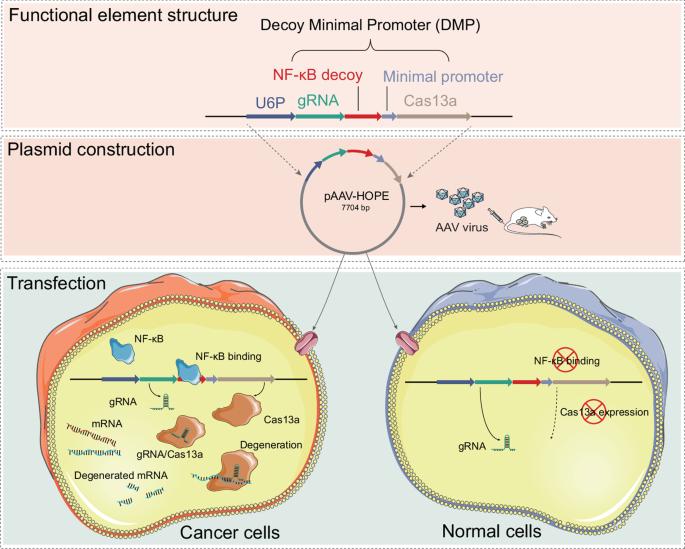用于癌症基因治疗的 NF-κB 激活癌基因抑制策略。
IF 4.8
3区 医学
Q1 BIOTECHNOLOGY & APPLIED MICROBIOLOGY
引用次数: 0
摘要
NF-κB是一种很有前景的癌症治疗靶点,因为几乎所有癌症都存在NF-κB过度激活的问题,但由于副作用,无数NF-κB抑制剂很少成为临床药物。与以抑制 NF-κB 活性为目的的传统癌症治疗方法不同,本研究开发了一种名为 HOPE 的新方法,其重点是利用之前构建的 NF-κB 特异性启动子 DMP 激活癌细胞内的外源效应基因 CRISPR-Cas13a,然后在 mRNA 水平上靶向抑制癌基因 TERT、PLK1、KRAS 和 MYC 的表达。我们评估了 HOPE 在各种培养细胞中的抗肿瘤作用,证实它能明显诱导癌细胞死亡,而不影响正常细胞。我们将 HOPE 包装成腺相关病毒(AAV),静脉注射治疗皮下移植的结直肠癌小鼠。这验证了rAAV-HOPE能在无副作用的情况下显著抑制肿瘤生长。根据 scRNA-seq 数据,我们观察到 HOPE 可以激活免疫系统,降低癌细胞的比例,尤其是降低癌细胞的干性。这项研究阐明了 HOPE 在体外和体内抑制癌细胞生长的重要作用,并为癌症基因治疗提供了一种新的治疗技术。本文章由计算机程序翻译,如有差异,请以英文原文为准。


NF-κB-activated oncogene inhibition strategy for cancer gene therapy
NF-κB is a promising target for cancer treatment because of its overactivation in almost all cancers but countless NF-κB inhibitors rarely became clinical drugs due to side effects. In contrast to traditional cancer treatments aimed at inhibiting NF-κB activity, this study develop a novel approach termed HOPE, which focuses on activating the exogenous effector gene CRISPR-Cas13a within cancer cells, achieved by utilizing the NF-κB-specific promoter DMP previously constructed, then targets and suppresses the expression of oncogenes TERT, PLK1, KRAS and MYC at mRNA level. We evaluated the antitumour effects of HOPE in various cultured cells and confirmed it could induce obvious the death of cancer cells without affecting normal cells. By packaging HOPE into adeno-associated virus (AAV) and intravenously injected it to treat mice that were subcutaneously transplanted with colorectal cancer. This validated that rAAV-HOPE could significantly inhibit tumour growth without side effects. Based on the scRNA-seq data, we observed that HOPE could activate the immune system and decrease the proportion of cancer cells, particularly reducing the stemness of cancer cells. This study elucidates an important role of HOPE in inhibiting cancer cell growth both in vitro and in vivo, additionally provides a novel therapeutic technology for cancer gene therapy.
求助全文
通过发布文献求助,成功后即可免费获取论文全文。
去求助
来源期刊

Cancer gene therapy
医学-生物工程与应用微生物
CiteScore
10.20
自引率
0.00%
发文量
150
审稿时长
4-8 weeks
期刊介绍:
Cancer Gene Therapy is the essential gene and cellular therapy resource for cancer researchers and clinicians, keeping readers up to date with the latest developments in gene and cellular therapies for cancer. The journal publishes original laboratory and clinical research papers, case reports and review articles. Publication topics include RNAi approaches, drug resistance, hematopoietic progenitor cell gene transfer, cancer stem cells, cellular therapies, homologous recombination, ribozyme technology, antisense technology, tumor immunotherapy and tumor suppressors, translational research, cancer therapy, gene delivery systems (viral and non-viral), anti-gene therapy (antisense, siRNA & ribozymes), apoptosis; mechanisms and therapies, vaccine development, immunology and immunotherapy, DNA synthesis and repair.
Cancer Gene Therapy publishes the results of laboratory investigations, preclinical studies, and clinical trials in the field of gene transfer/gene therapy and cellular therapies as applied to cancer research. Types of articles published include original research articles; case reports; brief communications; review articles in the main fields of drug resistance/sensitivity, gene therapy, cellular therapy, tumor suppressor and anti-oncogene therapy, cytokine/tumor immunotherapy, etc.; industry perspectives; and letters to the editor.
 求助内容:
求助内容: 应助结果提醒方式:
应助结果提醒方式:


